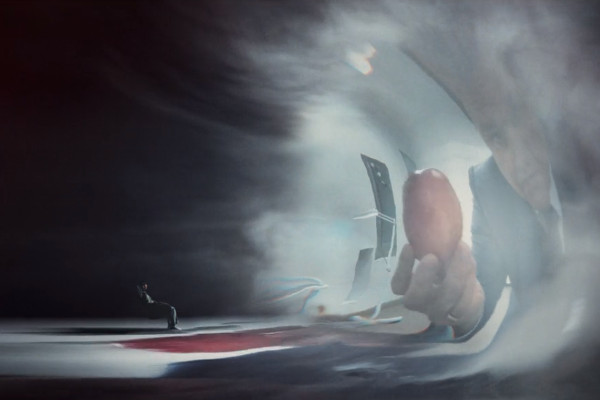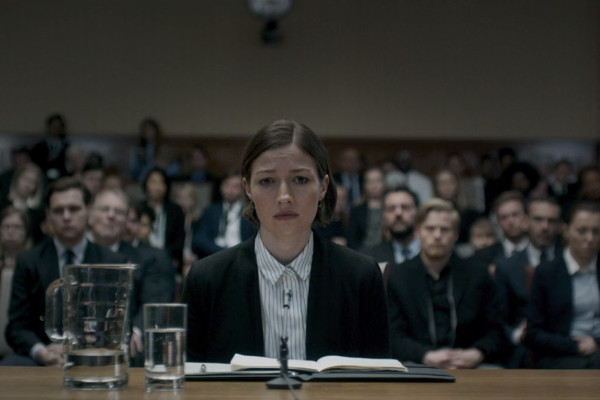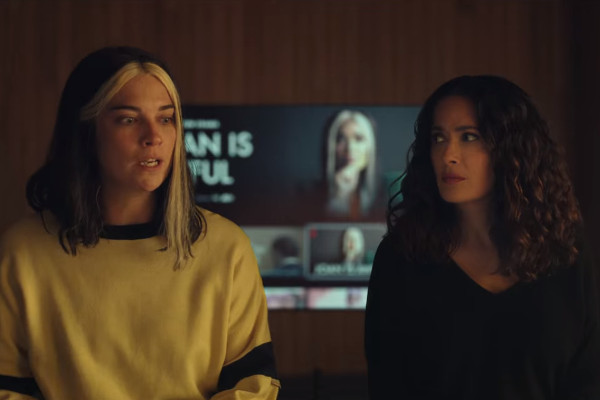


A young couple, drunk from a party, accidentally run down a cyclist and cover up the incident. Years later a different traffic accident is being investigated by an insurance firm using memory access technology, and the woman involved in the original accident (Andrea Riseborough) is a witness... but she knows that if she speaks to the insurance agent, she may unwittingly reveal her guilt through her memories.
It's a clever plot, but not especially original to the programme, and, really, the kind of thing that Black Mirror does in its sleep. A reward for fans are all the "Easter Eggs" involved, featuring references to other episodes. In particular, there's overt nods to some of the events in Fifteen Million Merits, including mentions of "Hot Shots", "Wraith Babes", and, of course, one particular song. This doesn't, sadly, take away from the final twist, which is more than a little silly, and not really necessary for a programme where a sense of karma is usually twisted, not earned.

Very much a retread of the Christmas special, as three separate tales become interconnected, chief among them being the exploration of human consciousness in a technological afterlife. The most graphic of the three stories is "Pain Addict", which was based on a story by the magician Penn Jillette. More interesting are ones where the human conscious can be shared, and the use of a virtual execution. However, while fine, it does feel like the series treading water and repackaging things we've already seen. Although the increase in episodes is welcome, the quality control does seem to waver when faced with developing so much extra product.

Beginning with a clear parody of clickbait columnist Katie Hopkins, this episode takes in Twitter hate campaigns, social media targeting and an army of killer robot bees. Look out too for some "Easter Eggs" in the episode - just before the hour mark there's a brief shot of a Twitter "trending" page... which includes the trending topics of a game mentioned in Playtest, the Prime Minister from The National Anthem, and the hashtag #FreeTheWhiteBearOne.
A police procedural drama, it does, due to the high technological content, depend heavily on characters not understanding each other and consequently needing things to be explained in chunks of jargon-based exposition. The longest Black Mirror episode at 89 minutes, it can be also be unnecessarily ponderous, placing length before engagement. While far from Black Mirror's worst instalment, it may ultimately be its dullest.

This isn't the first time that Black Mirror has done full immersion into video game technology (Playtest) and it's far from the first time it's done a form of computerised alternate reality (the seventh, and that's not even including Bandersnatch), but this may be a step forward to most of them. While Playtest was once ranked lowest of all the episodes as its characters were superficial, there's a sense here that high profile star Anthony Mackie has a character that's a bit more fleshed out with backstory... in fact, it's not until over 15 minutes in that we even see the central concept of the episode.
However, the use of men coming to terms with their sexuality and being slightly homophobic of their own actions is almost as old a trope as the 1987 computer fighting game that inspired the plot. While Black Mirror has to vary its outlook in order to survive, there is the feeling that the more fantastical entries make it, ironically, less of an immersive experience.
It's easy to believe in technology that can control modern politics, less easy to believe in full immersive technology. Yet this said, the artificial reality of White Christmas is ranked higher, so possibly it's that the presentation is, dare it be said, too American? Black Mirror began as a relatively cheap UK series, and for those who were with it from the start, it's still hard to accept A-List stars and Netflix $$$ transforming it significantly into more of a glossy fantasy series rather than a gritty realist drama. The scenes with Mackie in his real life are suitably mundane, making the contrast even more jarring.
With a 62 minute runtime, Striking Vipers can drag in spots, but the real issue is the fundamental, logical flaw at the heart of the episode: two very hetero men find themselves having sex as virtual characters in a video game, and wonder if that makes them gay? This would make some kind of sense if the characters they'd played were both women, but given their slightly macho outlook, you have to question why Yahya Abdul-Mateen II's Karl has any doubts, given that:
A. He decides he wants to play the female character in a fighting game;
B. Unlike Mackie's Danny, who at least has sex with a woman in the VR world, Karl is having VR sex with a man.
While the exploration goes slightly deeper than this quick summary can go into, there is a slightly "off" atmosphere in this tale of two dudes who practically want to end every sentence with "no homo". While an exploration of fluid sexuality amongst a dominant "alpha" culture can reward, this perhaps lacks the depth to really get into it, though it's notable that when Danny and Karl try to kiss in real life and say they felt nothing, at least one of them is lying...

Out of the 34 Black Mirror episodes, only 2 of them weren't written by Charlie Brooker. Nosedive has Brooker's involvement as the man who came up with the basic storyline and wrote a treatment, but the script itself was written by Rashida Jones and Michael Schur.
Featuring a world where people live or die by five-star ratings, such a concept is far from unrealistic in an age where Uber drivers are said to be dismissed if their ratings fall too low. Some reviewers have drawn parallels with the 2014 Community episode App Development and Condiments, with its amusing "MeowMeowBeenz" ratings app, but Brooker stated that he was not aware of the episode at the time of writing, and similarities between the two are largely superficial.
Although the Netflix seasons are released on the site in their entirety, meaning they can be watched in any order, Nosedive was marketed as the first episode of season three. It's a bold move, as it features exclusively American characters (albeit many played by English actors) and has a deliberate, pastel shade to fit with the theme of false projection. Like most of the Netflix episodes, it's lengthy (the average runtime for the Netflix entries is 62 minutes, as opposed to under 48 minutes for the regular Channel 4 episodes), but it compels thanks to a committed, vanity-free central performance by Bryce Dallas Howard, including an excruciating wedding speech.

This article has had some negative feedback, where the world of subjective ranking of episodes has met with some objections. From those who think that USS Callister and San Junipero are ranked too low, and those who think that The Waldo Moment is ranked too high, this may be the most contentious ranking yet... a widely unpopular episode that reached as high as thirteenth place when it was first released.
Possibly it's just a question of timing. Throughout this ranking I question the nature of a series that goes from a nihilistic, bleak and frequently twisted series into something brighter, glossier and more upbeat. Once popular, "happy" episodes like San Junipero were completely incongruous to the series... by 2019 they'd become positively expected.
So it is that a knockabout episode featuring rock stars touring electronically, a Miley Cyrus Alexa, and brain patterns being used to create music, gets ranked eleven places higher than you may have expected. Featuring a car dressed as a mouse, a comatose Miley singing "Anyone Who Knows What Love Is", and a character who ends the episode by breaking the fourth wall, it's watchable fluff, but the kind of thing that, had I seen it five years earlier, may have horrified me.

A pretty fun episode of Black Mirror, even if there's still a real debate over whether or not the show should be "fun". Featuring an evil streaming corporation heavily based around Netflix itself, and Salma Hayek getting to prove she's "a good sport" at sending herself up, it's all very meta.
The "Easter Eggs", mentioned in other entries, can go too far, with almost an anally retentive need to put all the episodes in the same "universe", even if it's logically unlikely that they could co-exist. Yet season six does quite well at keeping such "Eggs" as they should be - fun nods, rather than strict adherence to narrative. With that, this one features some other episodes as "Streamberry" choices, and it's the one to feature a brief snatch of an Irma Thomas song...